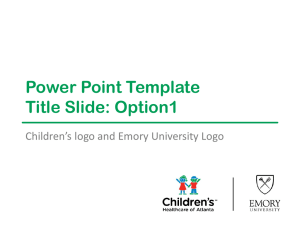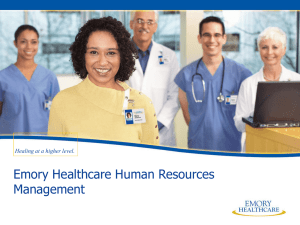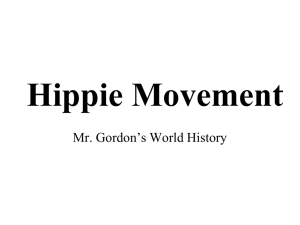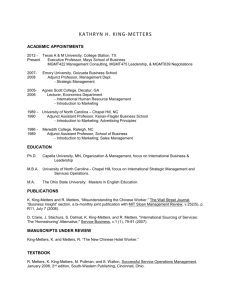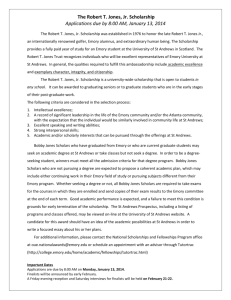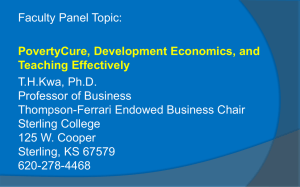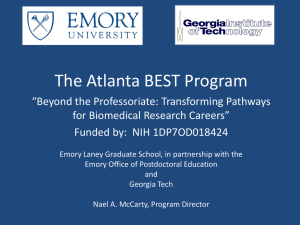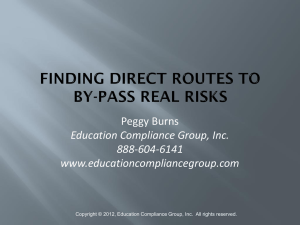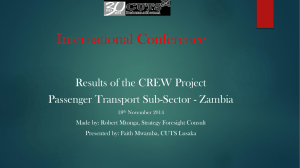Emory Bus 630: Competitive Advantage Kevin Coyne
advertisement
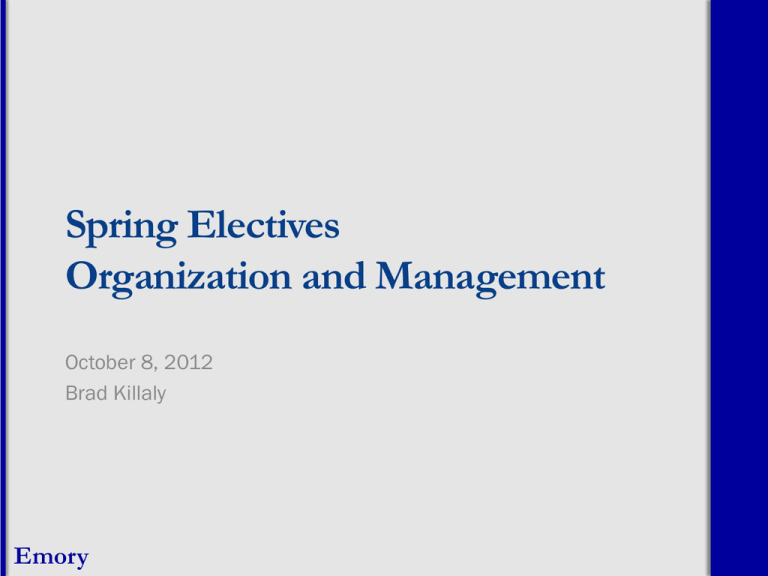
Spring Electives Organization and Management October 8, 2012 Brad Killaly Emory Selection • • • • • • • BUS 630: Competitive Advantage BUS 631: Social Enterprise BUS 535: Catalysing Social Impact BUS 635: Multinational Firms and Strategy BUS 636: Intro to Entrepreneurship BUS 661: Applied Entrepreneurship BUS 672: Corporate Strategy Emory Bus 630: Competitive Advantage Kevin Coyne • Goal: A company prospers only when its strategy cannot or will not be copied, even once competitors figure out it is better than theirs. This course teaches you how to develop such strategies. • Format: A combination of interactive lectures, cases, group projects and head-to-head competitions. • Valuable for a career in: Consulting, Private Equity, Venture Capital, Strategic Planning, CEO, Entrepreneur. Emory BUS 631: Social Enterprise Peter Roberts • ‘Mission driven organizations that apply market-based strategies to achieve some social purpose’. • We discuss the evolving role played by the social enterprise. This is followed by an elaboration of specific organizational and management challenges faced by social enterprises. We conclude by discussing careers in and around social enterprises. • Each student is required to contribute 20 hours over the semester to a social enterprise of her/his choosing. The content and form of these engagements are flexible, but they should be advantageous to both the student and the partner organization. Emory Topics Covered: • Nonprofits – Strategy; Growth & Scalability; Financing & Funding • For-Profit Social Enterprises; B Corporation Movement • Measuring Social Impact • Impact Investing: Financing Social Enterprises • Social Entrepreneurs • Global Social Enterprises; Social Enterprises & the Environment • Careers & the Social Enterprise Sector BUS 535: Catalyzing Social Impact Peter Roberts • Students gain experience developing creative but tractable business solutions to the complex challenges currently faced by individuals and organizations striving for meaningful social impacts. • Client partners specify a project and are promised a minimum of 400 pro-bono “billable hours”. • Projects launch on first day of the spring semester and findings and recommendations are presented to a audience of key stakeholders and interested individuals on the last days of the semester. • Engagements begin with and are guided by a clear understanding of the commitment we are making to our clients. In this respect, projects have regular deliverables. • Our clients benefit from the insights and recommendations that emanate from our students’ accumulated business acumen. Emory CSI - 2012 Projects • Grameen Bank (the global micro lending program that began in Bangladesh) operates in the U.S. as Grameen America. They approached Goizueta Business School and requested a market analysis that will help them understand the Atlanta market and determine where to establish their first Atlanta branch. • Funded by the Marcus Foundation, the Atlanta Jewish Gene Screen was launched with the aim of building awareness among doctors, rabbis, and the broader Atlanta communities about the nineteen genetic diseases affecting Ashkenazi Jews. The Marcus Foundation approached Goizueta Business School for an analysis of overall program philosophy, targeting and messaging; to identify reliable measures of program success; and to introduce a framework for expanding AJGS’ new model to a national scale. • To learn more about our approach and/or our 2013 projects, please contact Ellen Williams (eswill3@emory.edu) Emory BUS 635 Multinational Firms & Strategy Giacomo Negro • Content: • The impacts of social, cultural and political forces on multinational firms • Methods of corporate international expansion, and of organizing and controlling international operations • Competing in emerging markets • Format: • Cases • Lectures • Market entry project • Course is Useful and Interesting for those • Interested in understanding competitive processes and management spanning cross national boundaries & cultures • Consulting, careers in large cross border companies, entrepreneurs interested in understanding market and institutional differences. Emory BUS 636: Intro To Entrepreneurship Charlie Goetz • Want to control your own destiny? Than you might want to seriously consider building your own successful new business. • Goals of the class include, but are not limited to: • Learning how to develop successful new products/services that your market really wants and the successful tactics of serial entrepreneurs; • Discovering how a small business can compete effectively against much larger competitors; and • Building a business plan, that your team will use to raise money and craft an effective investor presentation. • How is this information provided in class? • We will use a combination of lectures, in-class exercises, successful entrepreneur speakers, and individual and team projects. • How would you benefit from taking this class? • Whether you decide to be an entrepreneur or not, the skills you learn in this class will be applicable in all areas of business. You will understand how a business works from the ground up. Emory BUS 661: Applied Entrepreneurship Charlie Goetz • For those who are willing to get their hands dirty and learn what it really takes to build a successful business, Applied Entrepreneurship is for you. Where the intro class ends at the raising of money, the Applied class starts off by putting you in the driver seat as senior management of a startup business. • Goals of the class include, but are not limited to: • Learning how successful startups build their businesses in ways that maximizes success and minimizes risk, in spite of very tight budgets, powerful entrenched competitors, and no market awareness. • How is this information provided in class? • Each team is given a startup business plan, where you will learn first-hand what it really takes to launch a business, manage employees generate prospect interest, and get customers to purchase. • To provide a real-life experience, teams will have to respond to unexpected curveballs that can easily derail their businesses entirely. • How would you benefit from taking this class? • It’s like building a real business on training wheels. No Risk… Emory BUS 672: Corporate Strategy Peter Thompson Learning Goals • Examines topics concerned with the creation and maintenance of value by multibusiness enterprises. • Concerned with issues such as the appropriate mix of business units; make-or-buy decisions; supplier contract design; the acquisition or development of new business units; disposal of existing business units. Learning Process • A typical week (150 minutes) will include: • 1-2 case studies (80 minutes) • Lecture and Q&A (50 minutes) • Experiments and simulations (20 minutes) • Review of key points, actionable items, and discussion of deliverables. (10 minutes) • Grading based on • • • Individual homework assignments Group write-ups of case studies and presentations Final exam Of Interest To • Current or future senior management levels in medium-size to large firms, with responsibilities for market penetration, diversification, major contracts or overall firm strategy. • Careers in consulting. • Juggling. Emory
